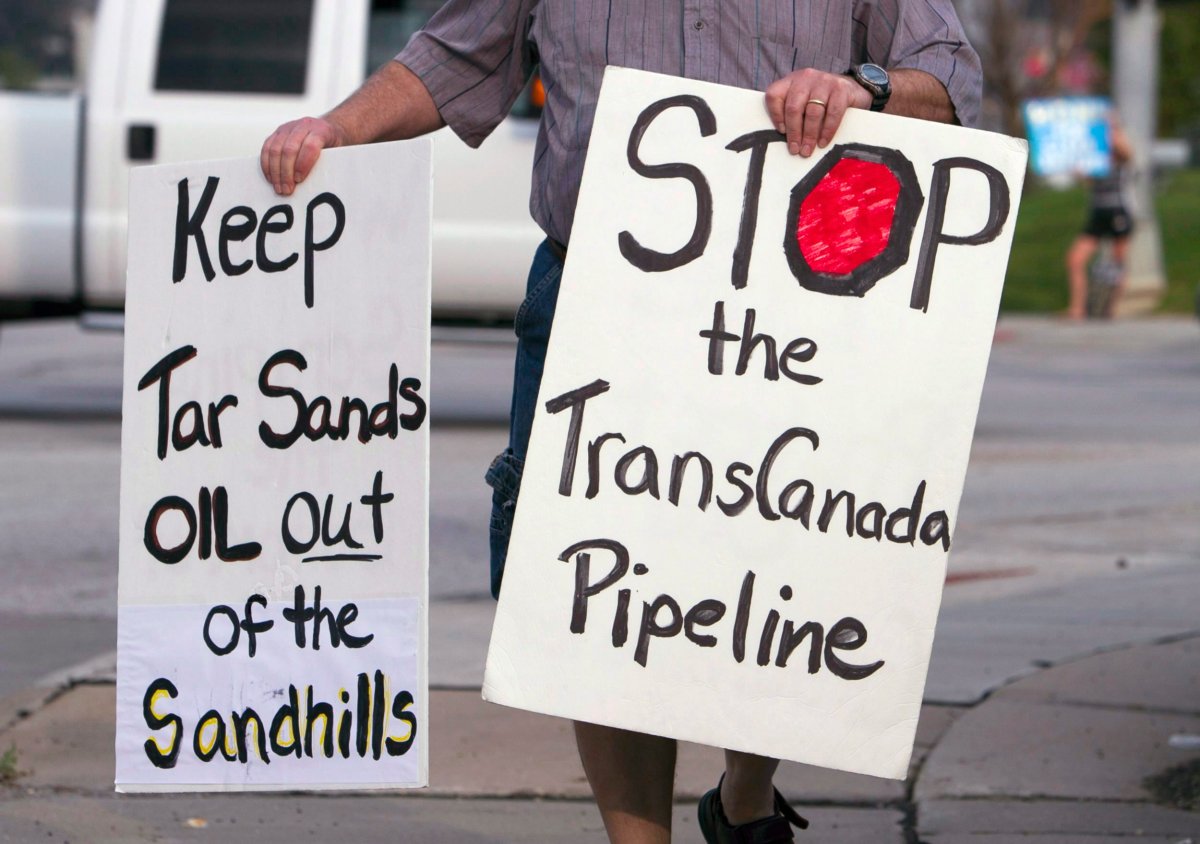The country has been split on two controversial plans to construct oil pipelines through several provinces and into the United States.

While supporters say the pipelines will create thousands of jobs as unemployment rates plummet, critics say the proposed plans could lead to mass oil spills and destruction of natural ecosystems.
As the fate of Enbridge’s Northern Gateway project is decided at lengthy public hearings in Kitimat, B.C., Globalnews.ca compares Enbridge’s plans with TransCanada’s Keystone XL proposal.
PROPOSAL:
ENBRIDGE: The Enbridge Northern Gateway oil pipeline is a proposed plan to build two dual pipelines that would take oilsands bitumen from Alberta to northwest B.C.’s Kitimat Village, through the Haisla First Nations community, over to a marine terminal. Reports suggest oil tankers the size of the Empire State Building will then carry oil to Asia and the U.S.
TRANSCANADA: The TransCanada Keystone XL pipeline project is a multi-billion dollar proposed plan to build a 3,100-km route to move more than 700,000 barrels of oil per day from Alberta to 15 refineries through the United States and into the Gulf of Texas.
COST ESTIMATES:
ENBRIDGE: $5.5 billion
TRANSCANADA: $7 billion
WHAT THE PIPELINE WOULD MOVE:
ENBRIDGE: One pipeline would carry between 400,000 to 1,000,000 barrels a day of crude oil from the Alberta tar sands to the BC coast while the second would carry 193,000 barrels a day.
- After controversial directive, Quebec now says anglophones have right to English health services
- Home reno spending was up $300B over pandemic, Re/Max Canada says
- Michael Kovrig reflects on ‘brutally hard’ Chinese detention: ‘You’re totally alone’
- U.S. moves to ban Chinese software, hardware from all vehicles in America
TRANSCANADA: More than 700,000 barrels would be moved a day from Alberta to 15 refineries on the Gulf Coast of Texas.

Get daily National news
LENGTH:
ENBRIDGE: Two parallel pipelines about 1,177 kilometres long from Bruderheim, Alta. To Kitimat, B.C.
TRANSCANADA: 3,100 kilometres from Alberta, through First Nations communities surrounding Regina and Saskatchewan to Nebraska and Illinois.
POTENTIAL JOB CREATION:
ENBRIDGE: According to northerngateway.ca, about 1,150 long-term jobs would be created across Canada – 560 jobs in B.C., 380 in Alberta and 210 in the rest of Canada.
The pipeline would generate manufacturing jobs from monitoring to pumping equipment to maintenance. The job created would equal $68 million each year in wages or $2 billion over a 30-year period, the company says.
Another 400 direct and indirect permanent jobs could be created along the pipeline’s route, Enbridge officials have said.
TRANSCANADA: On Jan. 10, the company released a detailed job breakdown for its pipeline project in response to critics who allege the multi-billion dollar plan is too costly and would only equate to around 200 temporary jobs.
TransCanada says the project will create 13,000 construction employment opportunities and another 7,000 in manufacturing in the U.S.
The breakdown outlines 17 U.S. pipeline segments, with 500 workers per segment, totaling 8,500 jobs.
Another 30 pump stations would require 3,000 workers and 600 more jobs would be needed at six construction camps in Oklahoma. Construction, management and inspection positions would add another 1,000 jobs.
PUBLIC OUTCRY:
ENBRIDGE: Ottawa’s Natural Resources Minister Joe Oliver kicked off hearings into the proposed plan Monday. The 18-month long hearings could last until 2013 as more than 4,300 people have signed up to speak to the federal review panel.
About a dozen First Nations communities opposed the plan, insisting the pipeline leaves residents with the possibility of a massive oil spill. Environmentalists argue that, with such a large project and so much oil being moved at a time, an oil spill is imminent.
TRANSCANADA: In September, about 500 people staged a protest on Parliament Hill to send a message to American and Canadian politicians. First Nations leaders and environmentalists from Greenpeace and the Sierra Club of Canada condemned the pipeline, alleging the project would damage natural ecosystems. They pointed to other communities who have to deal with cleanup in the wake of past oil spills.
A barrier was set up at the steps leading to Parliament, which protesters passed, leading to mass arrests.
POLITICAL REACTION:
ENBRIDGE: Natural Resources Minister Joe Oliver has complained that “radical” environmental groups funded with U.S. money are marring the pipeline hearings in Kitimat, B.C. The Liberals have accused the government of intimidating witnesses at the hearings and interfering with the environmental process as it unfolds.
TRANSCANADA: Environmentalists celebrated when the U.S. State Department pushed back its decision on the project in late 2011. U.S. authorities were expected to make a decision last year but delayed their final say for more consideration. American officials and Canada’s Conservative government say the pipeline would lead to job creation.








Comments